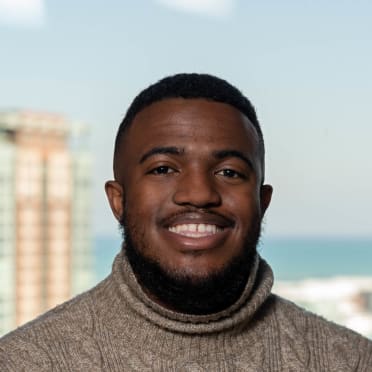Jackie Robinson Foundation spreads confidence, community
Panel's message to underrepresented communities: 'You deserve to be in the room'
NEW YORK -- Much of the work that goes into ensuring that Jackie Robinson¡¯s legacy is honored with the reverence it deserves begins with providing greater and equal opportunities for Black and underserved communities within baseball. And while the majority of the focus often falls on the field, an enormous amount of work goes on to illuminate the different avenues into the sport off the field.
Last month, MLB opened up its headquarters to host the Jackie Robinson Foundation Scholars for a special luncheon, including a panel discussion stocked with professionals across a wide swath of disciplines and fields. The goal? Educating the crop of college seniors on the bounty of ways that they could pursue a career in sports.
¡°With these events, we¡¯re providing exposure that other sectors quite frankly don¡¯t have,¡± MLB¡¯s director of community affairs, Kevin Moss, said. ¡°It¡¯s really a one-stop shop, you can be anywhere from finance to legal. That¡¯s what MLB can provide.¡±
Dressed to the nines and armed with legal pads, pens and business cards, the attendees were treated to a high-powered panel: Marianne Boak, senior vice president of enterprise products and data operations at MLB; Misha Hurd, senior manager of diversity, equity and inclusion for MLB; Chanel Lattimer, intellectual property attorney at MLB; and Dr. Jorge Aguilar, MD, PhD, a sports psychiatrist at Montefiore Medical Center in the Bronx who also works as a consultant to the league on its substance abuse and mental health policies.
With the wide range of experience presented, each panelist was a living example of the winding paths that someone could take to reach the pinnacle of one¡¯s profession. Whether people took multiple years of higher education or forays into the corporate world, or grinded their way through the various levels of their field, the messaging was consistent from each of the four panelists: There¡¯s no one blueprint for a career.
¡°I grew up as a first generation college student, really did not know what I wanted to do,¡± Hurd said. ¡°But growing up, I would see NBA Cares on TV. And that kind of put me on that path of wanting to combine my passion for helping others, and also growing up as a basketball player [pushed me towards] wanting work in sports as well.¡±
¡°I was a sociology major with a minor in African American studies -- I joke that an Ivy League education only sets you up to go to grad school,¡± Lattimer said. ¡°I knew I wanted to go to grad school, but frankly I wasn't really sure. So I took a job at a company called Steve and Berry¡¯s. ¡ I¡¯m a big proponent of taking some time off. Do what makes the most sense for you, but for me, it gave me the opportunity to work a bit and figure out what I wanted to do.¡±
The emphasis on the individual nature of one¡¯s journey coincided with a related vein of advice.
A common conceit was repeated often -- that lived experience and individuality is often a gift, and it¡¯s important to hold onto it. Finding out your interests and strengths is paramount to success, but retaining your identity in male- and white-dominated spaces is just as much of a priority.
¡°Early in my career, I would not sit at the table -- I would always take the back row,¡± Boak said. ¡°I would always just think that I don¡¯t have enough experience for my voice to matter in the room. And a lot of times I¡¯ve been the only woman in the room, and so I was intimidated and thought I can¡¯t speak -- that what I say doesn¡¯t matter.¡±
¡°I¡¯ll just add on to it, doubling down and saying that you deserve to be in the room,¡± Hurd said.
At the core of this luncheon, and the greater work that the Jackie Robinson Foundation undergoes for Black and Brown people across the country, was the urge to create a community that instills confidence in one another -- that pushes each other to create change in the world.
¡°So many of these kids that are part of the Jackie Robinson Foundation had to overcome incredible obstacles to get to where they are,¡± said Aguilar, ¡°and it¡¯s unnecessary for them to have to do that on their own.¡±
